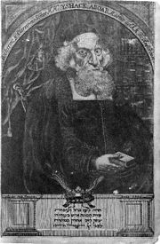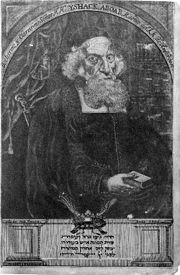
Isaac Aboab da Fonseca
Encyclopedia

Rabbi
In Judaism, a rabbi is a teacher of Torah. This title derives from the Hebrew word רבי , meaning "My Master" , which is the way a student would address a master of Torah...
, scholar, kabbalist and writer. In 1656, he was one of several elders within the Portuguese-Israelite community in the Netherlands
Netherlands
The Netherlands is a constituent country of the Kingdom of the Netherlands, located mainly in North-West Europe and with several islands in the Caribbean. Mainland Netherlands borders the North Sea to the north and west, Belgium to the south, and Germany to the east, and shares maritime borders...
who excommunicated
Excommunication
Excommunication is a religious censure used to deprive, suspend or limit membership in a religious community. The word means putting [someone] out of communion. In some religions, excommunication includes spiritual condemnation of the member or group...
Baruch Spinoza
Baruch Spinoza
Baruch de Spinoza and later Benedict de Spinoza was a Dutch Jewish philosopher. Revealing considerable scientific aptitude, the breadth and importance of Spinoza's work was not fully realized until years after his death...
for the statements this philosopher made concerning the nature of God
God
God is the English name given to a singular being in theistic and deistic religions who is either the sole deity in monotheism, or a single deity in polytheism....
.
Isaac Aboab da Fonseca was born in the Portuguese
Portugal
Portugal , officially the Portuguese Republic is a country situated in southwestern Europe on the Iberian Peninsula. Portugal is the westernmost country of Europe, and is bordered by the Atlantic Ocean to the West and South and by Spain to the North and East. The Atlantic archipelagos of the...
town of Castro Daire as Simão da Fonseca. His parents were Marranos, Jews who had been forcibly converted to Christianity
Christianity
Christianity is a monotheistic religion based on the life and teachings of Jesus as presented in canonical gospels and other New Testament writings...
. Although the family had ostensibly converted to Christianity, this did not put an end to local antisemitic suspicions. When Isaac was seven, the family moved to Amsterdam
Amsterdam
Amsterdam is the largest city and the capital of the Netherlands. The current position of Amsterdam as capital city of the Kingdom of the Netherlands is governed by the constitution of August 24, 1815 and its successors. Amsterdam has a population of 783,364 within city limits, an urban population...
. From that moment on, the family "reconverted" back to Judaism
Judaism
Judaism ) is the "religion, philosophy, and way of life" of the Jewish people...
, and Isaac was raised Jewish from that moment on. Together with Manasseh ben Israel, he was given lessons by the scholar Isaac Uziel
Isaac Uziel
Isaac ben Abraham Uziel was a Spanish physician and poet born at Fez. At one time he held the position of rabbi at Oran, but late in life he left that city to settle in Amsterdam, where he opened a Talmudical school which counted among its pupils Manasseh ben Israel...
.
At the age of eighteen, Isaac was appointed rabbi (chacham) for Beth Israel, one of three Sephardic communities which existed at that point in Amsterdam.
In 1642, Aboab da Fonseca was appointed rabbi at Kahal Zur Israel Synagogue
Kahal Zur Israel Synagogue
Kahal Zur Israel , located in Recife, Brazil, was the first Jewish congregation in the New World. It was established by immigrants from the Netherlands and joined by New Christians who were already living in the colony. There is now a museum on this site of the oldest synagogue site in the...
in the Dutch colony of Pernambuco
Pernambuco
Pernambuco is a state of Brazil, located in the Northeast region of the country. To the north are the states of Paraíba and Ceará, to the west is Piauí, to the south are Alagoas and Bahia, and to the east is the Atlantic Ocean. There are about of beaches, some of the most beautiful in the...
(Recife
Recife
Recife is the fifth-largest metropolitan area in Brazil with 4,136,506 inhabitants, the largest metropolitan area of the North/Northeast Regions, the 5th-largest metropolitan influence area in Brazil, and the capital and largest city of the state of Pernambuco. The population of the city proper...
), Brazil
Brazil
Brazil , officially the Federative Republic of Brazil , is the largest country in South America. It is the world's fifth largest country, both by geographical area and by population with over 192 million people...
. Most of the white inhabitants of the town were Sephardic Jews from Portugal who had been banned by the Portuguese Inquisition
Portuguese Inquisition
The Portuguese Inquisition was formally established in Portugal in 1536 at the request of the King of Portugal, João III. Manuel I had asked for the installation of the Inquisition in 1515 to fulfill the commitment of marriage with Maria of Aragon, but it was only after his death that the Pope...
to this town at the other side of the Atlantic Ocean
Atlantic Ocean
The Atlantic Ocean is the second-largest of the world's oceanic divisions. With a total area of about , it covers approximately 20% of the Earth's surface and about 26% of its water surface area...
. In 1624, the colony had been occupied by the Dutch. By becoming the rabbi of the community, Aboab da Fonseca was the first appointed rabbi of the Americas. The name of his congregation was Kahal Zur Israel Synagogue
Kahal Zur Israel Synagogue
Kahal Zur Israel , located in Recife, Brazil, was the first Jewish congregation in the New World. It was established by immigrants from the Netherlands and joined by New Christians who were already living in the colony. There is now a museum on this site of the oldest synagogue site in the...
and the community had a synagogue, a mikveh and a yeshiva
Yeshiva
Yeshiva is a Jewish educational institution that focuses on the study of traditional religious texts, primarily the Talmud and Torah study. Study is usually done through daily shiurim and in study pairs called chavrutas...
as well. However, during the time he was rabbi in Pernambuco, the Portuguese re-occupied the place again in 1654, after a struggle of nine years. Aboab da Fonseca managed to return to Amsterdam after the occupation of the Portuguese. Members of his community immigrated to North America
North America
North America is a continent wholly within the Northern Hemisphere and almost wholly within the Western Hemisphere. It is also considered a northern subcontinent of the Americas...
and were among the founders of New York City
New York City
New York is the most populous city in the United States and the center of the New York Metropolitan Area, one of the most populous metropolitan areas in the world. New York exerts a significant impact upon global commerce, finance, media, art, fashion, research, technology, education, and...
.
Back in Amsterdam, Aboab da Fonseca was appointed chief rabbi for the Sephardic community. In 1656, he was one of several scholars who excommunicated the famous philosopher Baruch Spinoza. During the reign of Aboab da Fonseca, the community flourished; the Portuguese synagogue (the Esnoga
Amsterdam Esnoga
The Portuguese Synagogue also known as the Esnoga , or Snoge, is a 17th-century Sephardic synagogue in Amsterdam. Esnoga is the Ladino word for synagogue.-Background:...
) was inaugurated on August 2, 1675 (10 Av 5435).
On April 4, 1693, Isaac Aboab da Fonseca died at the age of eighty-eight in Amsterdam.
In 2007, the Machon Yerushalaim published a book about Rabbi Fonseca's works, including the author's expositions about the community of Recife at that time. The book is called Chachamei Recife V'Amsterdam, or The Sages of Recife and Amsterdam.
See also
- History of the Jews in the NetherlandsHistory of the Jews in the NetherlandsMost history of the Jews in the Netherlands was generated between the end of the 16th century and World War II.The area now known as the Netherlands was once part of the Spanish Empire but in 1581, the northern Dutch provinces declared independence...
- Sephardic Jews in the NetherlandsSephardic Jews in the NetherlandsAs a result of the Inquisition, many Sephardim left the Iberian peninsula at the end of the 15th century and throughout the 16th century, in search for religious freedom. Some of them found their way to the newly independent Dutch provinces: independent from the reign of Spain, Sephardic Jews from...
- Manasseh ben Israel
- MarranoMarranoMarranos were Jews living in the Iberian peninsula who converted to Christianity rather than be expelled but continued to observe rabbinic Judaism in secret...
- Spanish and Portuguese JewsSpanish and Portuguese JewsSpanish and Portuguese Jews are a distinctive sub-group of Sephardim who have their main ethnic origins within the Jewish communities of the Iberian peninsula and who shaped communities mainly in Western Europe and the Americas from the late 16th century on...

